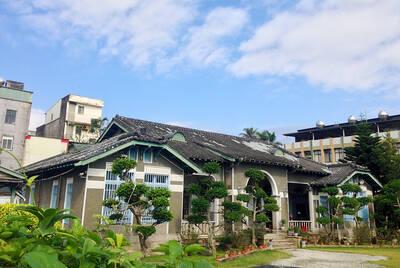N o one can tug at the heartstrings without even hitting the high notes like Japanese folk/pop singer Kousuke Atari (中孝介) can.
Atari, who has the looks of a smoldering sex symbol but sings with a soft-spoken and poignant voice, became a pop icon in Taiwan with his film debut in Cape No. 7 (海角七號) in 2008, and then with his role as a folk-singing customer in the art-house flick Taipei Exchanges (第36個故事) last year. The pop crooner will perform 2011 Kousuke Atari Taipei Concert (2011中孝介台北演唱會), his third concert in Taiwan, at Legacy Taipei (傳音樂展演空間) on June 26.
Born in the Amami island region in southern Japan, Atari is acclaimed for his take on the shima-uta (island song) style popular in the area. The media has dubbed Atari “the most tender voice on Earth” for his understated but emotionally compelling vocals.

Photo Courtesy of Sony Music
“The first impression I got from shima-uta was nostalgia,” Atari wrote in an e-mail interview with the Taipei Times earlier this week. “It’s the feeling of loving people, or feeling homesick, or being moved from looking at beautiful views or listening to good music. I want to express these feelings when I sing ... A good singer is someone who can describe the scenery behind the songs.”
In accord with his image as a down-to-earth folk crooner who has a fondness for wearing wrinkled linen shirts, many of Atari’s songs eulogize earthly beauty with titles such as Summer Sky, Haru (Spring) and Hana (Flower).
“Various types of flowers bloom in various seasons. They all look different for each of the four seasons in Japan,” Atari said. “I want to sing about the connections between people and nature and describe that kind of warmth through songs.”
Atari’s only two film appearances have been in Taiwanese films.
“I decided to appear in these movies because both of them have nostalgic and beautifully written stories with beautiful cities and views,” Atari said.
The pop heartthrob’s Taiwanese connection goes beyond cinematic appearances. He covered Taiwan pop star Wang Lee-hom’s (王力宏) The Heart of the Sun and the Moon (心中的日月) on his mainstream debut album Natsukasyha (觸動心弦) in 2006.
He also sank his teeth into Malaysian pop crooner Michael Wong’s (光良) Fairy Tale (童話) on his 2007 album Hua Jian Dao (花間道).
Not satisfied with the occasional Mando-pop cover, Atari went on to release the album Tyuukaken Best (像樂器一樣的聲音) expressly for the Chinese-speaking market last year. The project, a cover album on which he spins Japanese renditions of Mando-pop classics, contains tracks such as Eason Chan’s (陳奕迅) Ten Years (十年) and Teresa Teng’s (鄧麗君) On the Side of the Water (在水一方).
Atari also tackles singing in Mandarin for the first time on this album, performing Chinese composer/producer Zhang Yadong’s (張亞東) Tibetan Plateau (青藏高原).
“Yadong asked if I wanted to sing this song. When I heard it, it really caught my heart,” Atari said. “With Yadong helping me on the accents and the way to express it, I think I was able to create a new way of expression for the song.”
With his two appearances in Taiwanese films and the Mando-pop cover album, Atari has become that rare Japanese singer whose career is closely knitted with Taiwan’s pop market.
After Taipei, Atari will continue his tour of Asia with performances in China’s Guangzhou on July 8 and Shenzhen on July 9.

From the last quarter of 2001, research shows that real housing prices nearly tripled (before a 2012 law to enforce housing price registration, researchers tracked a few large real estate firms to estimate housing price behavior). Incomes have not kept pace, though this has not yet led to defaults. Instead, an increasing chunk of household income goes to mortgage payments. This suggests that even if incomes grow, the mortgage squeeze will still make voters feel like their paychecks won’t stretch to cover expenses. The housing price rises in the last two decades are now driving higher rents. The rental market

July 21 to July 27 If the “Taiwan Independence Association” (TIA) incident had happened four years earlier, it probably wouldn’t have caused much of an uproar. But the arrest of four young suspected independence activists in the early hours of May 9, 1991, sparked outrage, with many denouncing it as a return to the White Terror — a time when anyone could be detained for suspected seditious activity. Not only had martial law been lifted in 1987, just days earlier on May 1, the government had abolished the Temporary Provisions Effective During the Period of National Mobilization for Suppression of the Communist

When life gives you trees, make paper. That was one of the first thoughts to cross my mind as I explored what’s now called Chung Hsing Cultural and Creative Park (中興文化創意園區, CHCCP) in Yilan County’s Wujie Township (五結). Northeast Taiwan boasts an abundance of forest resources. Yilan County is home to both Taipingshan National Forest Recreation Area (太平山國家森林遊樂區) — by far the largest reserve of its kind in the country — and Makauy Ecological Park (馬告生態園區, see “Towering trees and a tranquil lake” in the May 13, 2022 edition of this newspaper). So it was inevitable that industrial-scale paper making would

Hualien lawmaker Fu Kun-chi (傅?萁) is the prime target of the recall campaigns. They want to bring him and everything he represents crashing down. This is an existential test for Fu and a critical symbolic test for the campaigners. It is also a crucial test for both the Chinese Nationalist Party (KMT) and a personal one for party Chairman Eric Chu (朱立倫). Why is Fu such a lightning rod? LOCAL LORD At the dawn of the 2020s, Fu, running as an independent candidate, beat incumbent Democratic Progressive Party (DPP) lawmaker Hsiao Bi-khim (蕭美琴) and a KMT candidate to return to the legislature representing